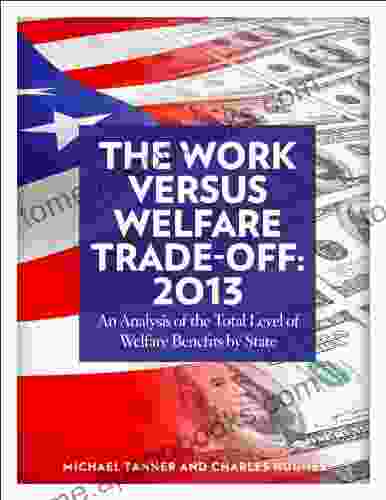The Work Versus Welfare Trade Off 2024: A Comprehensive Guide to Making Informed Decisions


4 out of 5
| Language | : | English |
| File size | : | 842 KB |
| Text-to-Speech | : | Enabled |
| Enhanced typesetting | : | Enabled |
| Word Wise | : | Enabled |
| Print length | : | 72 pages |
| Screen Reader | : | Supported |
The debate over work versus welfare has been a contentious one for decades, with no easy answers. On the one hand, there is a strong belief that able-bodied individuals should be required to work in Free Download to receive government assistance. On the other hand, there is also a recognition that many people face barriers to employment, such as lack of education, skills, or childcare.
In the United States, the welfare system has undergone a number of reforms in recent years, with a focus on increasing work requirements. The Personal Responsibility and Work Opportunity Reconciliation Act of 1996 (PRWORA) was a major turning point in welfare policy, shifting the focus from cash assistance to work requirements. PRWORA also gave states more flexibility in designing their own welfare programs.
As a result of these reforms, the number of people receiving welfare has declined significantly. However, there is still a debate about the effectiveness of work requirements. Some argue that work requirements have helped to reduce poverty and increase work participation. Others argue that work requirements have made it more difficult for people to access needed assistance.
The work versus welfare trade-off is a complex issue with no easy answers. In this article, we will explore the complex relationship between work and welfare, examining the trade-offs and challenges faced by individuals and policymakers alike. We will delve into the historical evolution of welfare programs, analyze the impact of welfare on work participation, and consider the ethical implications of balancing work requirements with social safety nets.
Historical Evolution of Welfare Programs
The history of welfare programs in the United States can be traced back to the colonial era. In the early days, welfare was primarily provided by local governments and charities. The federal government began to play a more active role in welfare in the early 20th century, with the passage of the Social Security Act in 1935.
The Social Security Act established a number of programs to provide financial assistance to the elderly, the disabled, and the unemployed. The Aid to Families with Dependent Children (AFDC) program, which provided cash assistance to single mothers, was created in 1935.
AFDC was the largest welfare program in the United States for many years. However, the program came under increasing criticism in the 1980s and 1990s. Critics argued that AFDC was too generous and that it discouraged work.
In 1996, Congress passed PRWORA, which reformed AFDC and replaced it with the Temporary Assistance for Needy Families (TANF) program. TANF is a block grant program that gives states more flexibility in designing their own welfare programs. TANF also includes work requirements for most able-bodied adults.
Impact of Welfare on Work Participation
The impact of welfare on work participation is a complex and controversial issue. Some studies have found that welfare can discourage work, while other studies have found that welfare can have a positive impact on work participation.
A study by the Congressional Budget Office found that TANF has had a modest positive impact on work participation. The study found that TANF increased work participation among single mothers by about 2 percentage points.
However, a study by the Center on Budget and Policy Priorities found that TANF has had a negative impact on work participation among low-income families. The study found that TANF reduced work participation among low-income families by about 1 percentage point.
The impact of welfare on work participation is likely to vary depending on a number of factors, such as the design of the welfare program, the characteristics of the welfare population, and the state of the economy.
Ethical Implications of Work Requirements
The ethical implications of work requirements are complex and contested. Some argue that work requirements are necessary to ensure that able-bodied adults are contributing to society. Others argue that work requirements are unfair to people who face barriers to employment.
One of the main ethical concerns about work requirements is that they can make it more difficult for people to access needed assistance. This is especially true for people who have disabilities, mental health issues, or other barriers to employment.
Another ethical concern about work requirements is that they can lead to discrimination against low-income people. For example, some employers may be less likely to hire someone who has a history of receiving welfare.
The ethical implications of work requirements must be carefully considered when designing welfare programs. It is important to ensure that work requirements are fair and that they do not make it more difficult for people to access needed assistance.
The work versus welfare trade-off is a complex issue with no easy answers. There are valid arguments on both sides of the issue. Ultimately, the best approach to welfare policy is likely to vary depending on the specific circumstances of each individual and each community.
It is important to remember that welfare programs are not just about providing financial assistance. They are also about providing support and opportunities for people to improve their lives. When designing welfare programs, it is important to consider the needs of the whole person, not just their ability to work.
4 out of 5
| Language | : | English |
| File size | : | 842 KB |
| Text-to-Speech | : | Enabled |
| Enhanced typesetting | : | Enabled |
| Word Wise | : | Enabled |
| Print length | : | 72 pages |
| Screen Reader | : | Supported |
Do you want to contribute by writing guest posts on this blog?
Please contact us and send us a resume of previous articles that you have written.
 Book
Book Novel
Novel Page
Page Chapter
Chapter Text
Text Story
Story Genre
Genre Reader
Reader Library
Library Paperback
Paperback E-book
E-book Magazine
Magazine Newspaper
Newspaper Paragraph
Paragraph Sentence
Sentence Bookmark
Bookmark Shelf
Shelf Glossary
Glossary Bibliography
Bibliography Foreword
Foreword Preface
Preface Synopsis
Synopsis Annotation
Annotation Footnote
Footnote Manuscript
Manuscript Scroll
Scroll Codex
Codex Tome
Tome Bestseller
Bestseller Classics
Classics Library card
Library card Narrative
Narrative Biography
Biography Autobiography
Autobiography Memoir
Memoir Reference
Reference Encyclopedia
Encyclopedia Arne Fronsdal
Arne Fronsdal Megan Dowd Lambert
Megan Dowd Lambert Claire Prentice
Claire Prentice Sharon Kaye
Sharon Kaye Hans Wilhelm Alt
Hans Wilhelm Alt Jean Khalfa
Jean Khalfa Ember Leigh
Ember Leigh Gregg Squeglia
Gregg Squeglia Antoni Estevadeordal
Antoni Estevadeordal Archon Fung
Archon Fung Shirtaloon
Shirtaloon Aristotle
Aristotle Arthur Byrd
Arthur Byrd April Aasheim
April Aasheim Avay Shukla
Avay Shukla Anton Tenkei Coppens
Anton Tenkei Coppens Atrey Tejas Rayaprolu
Atrey Tejas Rayaprolu Vivienne Zhang
Vivienne Zhang Atarah Ben Tovim
Atarah Ben Tovim Sharon Dunn
Sharon Dunn
Light bulbAdvertise smarter! Our strategic ad space ensures maximum exposure. Reserve your spot today!

 Abe MitchellJourney into the Profound: "It's Great to be Down" Unveils the Transformative...
Abe MitchellJourney into the Profound: "It's Great to be Down" Unveils the Transformative... Julio Ramón RibeyroFollow ·6.4k
Julio Ramón RibeyroFollow ·6.4k Russell MitchellFollow ·11.1k
Russell MitchellFollow ·11.1k Ethan MitchellFollow ·19.1k
Ethan MitchellFollow ·19.1k Jaime MitchellFollow ·4.3k
Jaime MitchellFollow ·4.3k Jamison CoxFollow ·17.1k
Jamison CoxFollow ·17.1k Alexander BlairFollow ·13.8k
Alexander BlairFollow ·13.8k Don ColemanFollow ·18k
Don ColemanFollow ·18k Gerald ParkerFollow ·12.7k
Gerald ParkerFollow ·12.7k

 Gabriel Garcia Marquez
Gabriel Garcia MarquezLad Dog Baby Professor: The Perfect Book for Your Child
Lad Dog Baby...

 Fredrick Cox
Fredrick CoxAn Excerpt With Fifty Ways To Help Animals Promo Books:...
: Embracing Animal...

 Kelly Blair
Kelly Blair5th Grade US History: Famous US Authors: Fifth Grade...
Step into a captivating world of historical...

 Natsume Sōseki
Natsume SōsekiKull the Destroyer: A Timeless Tale of Sword and Sorcery
The Creation of a...

 Jim Cox
Jim CoxDas Ist Supertoll: Unlocking the Magic of German for Kids
Immersive Learning with...

 Bruce Snyder
Bruce SnyderUnlock the World of Quilting for Kids: Discover "Quick...
Are you ready to embark on a delightful...
4 out of 5
| Language | : | English |
| File size | : | 842 KB |
| Text-to-Speech | : | Enabled |
| Enhanced typesetting | : | Enabled |
| Word Wise | : | Enabled |
| Print length | : | 72 pages |
| Screen Reader | : | Supported |










